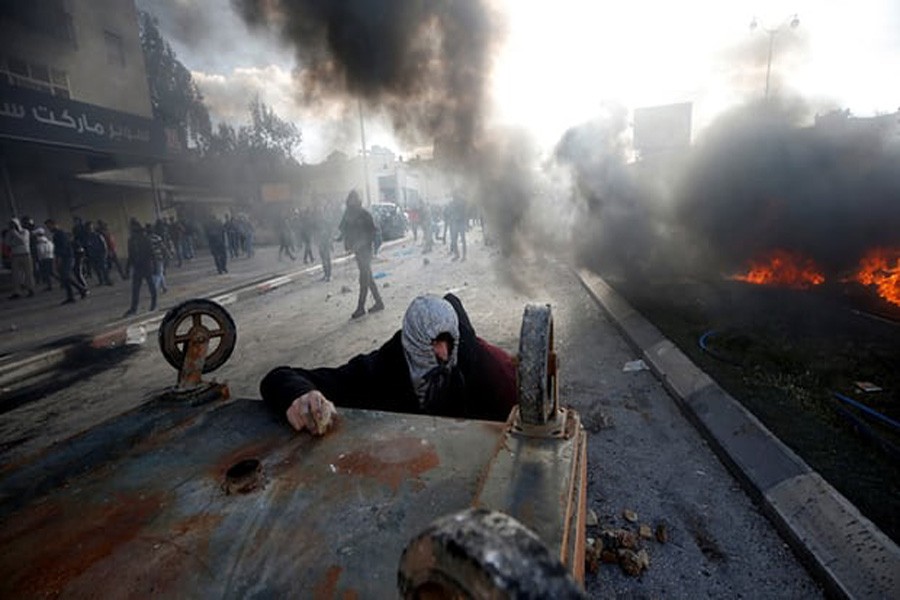US missions across the Middle East are braced for a second day of violent protests over Donald Trump’s recognition of Jerusalem as Israel’s capital after widespread clashes between Palestinians and Israeli forces on Thursday.
American diplomatic staff and families are operating under tight security restrictions ordered by the state department as fears mounted that spreading protests could target US interests in the region after Friday prayers.
Israel deployed extra security forces in anticipation of more clashes in Jerusalem and West Bank cities.
The increased security measures came as Hezbollah’s secretary general, Hassan Nasrallah, echoed calls made by Hamas earlier in the day for support for a new Palestinian intifada.
The most violent confrontations on Thursday occurred in Ramallah, Bethlehem and Hebron, where Israeli forces fired teargas and plastic-coated rounds as hundreds of protesters threw stones and set alight barricades.
In the Gaza Strip, dozens of protesters gathered near the border fence with Israel and clashed with Israeli troops. Two missiles reportedly launched against Israel later in the day both detonated within the coastal enclave.
Protests took place across the region: in Jordan, demonstrators near the US embassy in Amman torched the US flag and pictures of Trump. In Tunisia, thousands of people joined peaceful protests in Tunis and several other cities, and labour unions called for even bigger demonstrations after Friday prayers.
The UN security council called a meeting for Friday to discuss Trump’s decision, condemnation of which continues to mount across the Middle East and internationally.
Eight countries on the 15-member council requested the meeting, including the UK, Italy and France, amid claims from Palestine and Turkey that the recognition was in breach of international law and UN resolutions.
The EU foreign policy chief, Federica Mogherini, said the bloc had a united position that Jerusalem must be the capital of both Israel and a future Palestinian state. France said it rejected the “unilateral” US decision, while the UK prime minister, Theresa May, and the foreign secretary, Boris Johnson, both described Trump’s announcement as “unhelpful”.
The Russian foreign ministry said US recognition risked “dangerous and uncontrollable consequences”.
The Palestinian Authority announced that the US vice-president, Mike Pence, would “not be welcome in Palestinian Territories” when he travels to the region later this month.
Pence had been scheduled to meet the Palestinian president, Mahmoud Abbas, during the trip, but Jibril Rajoub, a senior Fatah figure, said that the meeting would not take place.
Israel’s prime minister, Benjamin Netanyahu, hailed the US move as “historic” and claimed other countries were in contact about following Trump’s lead. But he was alone among regional leaders in praising the decision.
Saudi Arabia’s royal court called it “unjustified and irresponsible”, in a rare rebuke of the US, and Turkey’s president, Recep Tayyip Erdoğan, said Trump had thrown the Middle East
Thursday’s confrontations on the West Bank took place during a widely observed general strike that closed Palestinian shops and schools. The presence of Palestinian police in plain clothes and armed security forces in uniform nearby suggested a degree of control by the Palestinian president, Mahmoud Abbas.
The scale of the protests and level of violence noticeably fell short of similar clashes at the height of the second intifada.
At one large confrontation in Ramallah, a group of three teenage girls, their faces masked with headscarves, told reporters: “Trump can go to hell.”
In Jerusalem’s Old City, where most Palestinian shops were shut, Salah Zuhikeh, 55, told Agence France-Presse: “By this decision, America became a very small country, like any small country in the world, like Micronesia. America was a great country for us and everyone.”
Trump defied overwhelming global opposition by recognising Jerusalem as the capital of Israel on Wednesday and directing the state department to start making arrangements to move the US embassy from Tel Aviv, reports The Gusrdian.
“While previous presidents have made this a major campaign promise, they failed to deliver. Today, I am delivering,” he said in a short speech at the White House. “My announcement today marks the beginning of a new approach to the conflict between Israel and the Palestinians.”
It later emerged, in a memo leaked to Reuters news agency, that the US had privately asked Israel to temper its response to the announcement.
The state department document, dated 6 December, stated in talking points for diplomats at the US embassy in Tel Aviv to convey to Israeli officials: “While I recognise that you will publicly welcome this news, I ask that you restrain your official response.”
It continued: “We expect there to be resistance to this news in the Middle East and around the world. We are still judging the impact this decision will have on US facilities and personnel overseas.
“You know that this is a unique administration. It makes bold moves. But it is bold moves that are going to be needed if peace efforts are finally going to be successful.”


